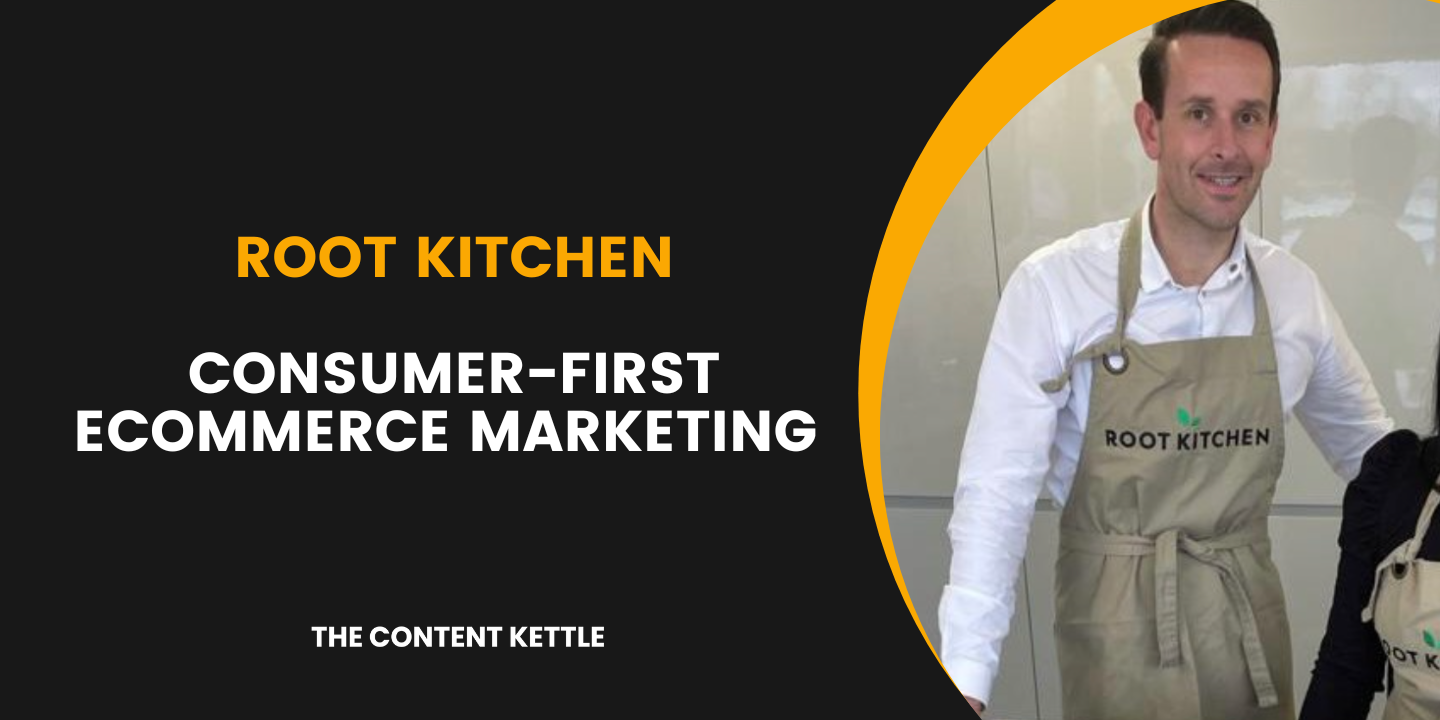We turned to online shopping during the pandemic more than we ever did. Even for the very basics such as day-to-day meals, giving rise to an industry that predominantly remained offline, to go online. Yes, we’re talking about restaurants, cafes, bakeries and all the yummy food you can imagine right now.
But with the ease of taking your brand online, comes the challenge of capturing consumer attention. Add to that a mix of how skeptical each one of us has now become about consuming “outside” food, and you’ll know exactly how difficult eCommerce marketing in the food industry is.
In this episode of Content Kettle, David Beaver, the Co-Founder of Root Kitchen, a brand known for its chef-prepared, tasty plant-based frozen meals delivered to your doorstep, shares his take on running an online direct-to-consumer delivery service in the food industry and the importance of the consumer-first approach.
About Root Kitchen
Root Kitchen was started by David & Rishma, a brother-in-law – sister-in-law duo. The idea for this project struck in 2019 when Rishma was diagnosed with Myalgic Encephalomyelitis (M.E.), a neurological condition. Owing to her situation, she had to make drastic changes in her dietary habits.
However, Rishma soon realized there were very few convenient, nutritious and affordable options for people like her. And hence, they started Root Kitchen.
They say they are on a mission to fill Britain’s freezers with amazing 100% plant-based frozen meals.
David’s in-laws had been running a business of unlabelled ready meals for local supermarkets for around 25 years now. This gave them a headstart on understanding a lot of the aspects involved in the food industry. They were gradually pushed to the online space during the pandemic.
Here’s what David had to share based on their experience.
Lessons on eCommerce marketing from the Founder of Roots Kitchen
Look at yourself as a customer
When trying to sell something, especially in the food industry, ask yourself “Would you buy this?”, stresses David.
Most people view vegan meals as either tasteless or having a ‘disgusting’ taste. This was and still is one of their biggest challenges.
David shares a very interesting recipe they came up with at Root Kitchen – Tofu Tikka Masala. He says they tried to keep the sauce and base look and taste (very closely) like traditional tikka masala. Thus, making it easier to accept and consume while at the same time enjoy veganism to the fullest.
As a young vegan himself, this recipe helped him tremendously gradually accept and transition to this new sphere of consumption, he says.
Place yourself in your customer’s shoes and you’ll see all those blanks that need to be filled and questions that need to be answered. In David’s tiny example above, the blanks were the taste and the look.
You just need to get moving once you figure this out!
Trust is the greatest asset you’ll have in your business
Only and only if a customer believes in you, will they make a choice of investing their time and money in your products.
At the Root Kitchen, they work on transparency and accountability to build trust. They do this with a clear, crisp and honest brand story. Everything about them is right out there – on their website, Facebook, Instagram and even TikTok handles now.
Stories help customers connect emotionally. And emotions play a huge role in marketing strategies. In your story, don’t just stress the company’s point of view but also show how your customer’s life is a whole lot better because of you.
Work towards gaining your customer’s trust and numbers will follow.
Consumer-first approach means building a collaborative relationship
Keep a two-way communication going on. Ask them what worked for them and what didn’t. In continuation with the previous point, if the customer trusts and believes in you, they will have your best interest in mind.
Leverage this and keep the reviews flowing. Offer them what they want!
Be responsible
He urges everyone to evaluate their carbon footprint, especially businesses. There are so many smaller decisions we can make to achieve sustainability, he adds.
As dutiful as it is, it also helps brands stand out as well-informed, well-aware and rightly concerned about the world and people around them. In fact, consumers expect brands to be more responsible and walk the path towards being ‘woke’ today. They want the companies they trust the most to take a stand – the ‘rightful’ stand.
He mentions how at Root Kitchen, they have gone through great lengths just to ensure the packaging was as sustainable as possible, for instance.
“Support a cause”, he adds. They support veganism. So, they work towards educating people about plant-based diets, how to get proteins from vegan meals and so on.
Listen more about David’s experiences with their brand’s online presence and how the visual appeal of the food industry played a role in choosing the right platforms, his two cents worth to budding companies and so much more in this episode here.
Content Kettle is our E-Commerce Special podcast. Starting an eCommerce business may have gotten easier. But taking your products to buyers is getting tougher by the day. In the age of rising competition and a digital-first take on consumer-brand relationships, what eCommerce marketing strategies really work? In this podcast, we talk to brand owners, marketers and eCommerce experts to help you reach ‘what works’, faster.


